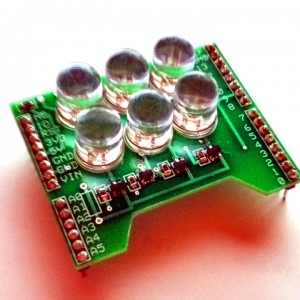- Bellow is the sample code to power the IR shield.
- The sample flashes from Channel 1 to 2 to 3 and varies the intensity of the LEDs as well.
- The ability to set the intensity is crucial. All too often we see images that are wiped out from to strong IR.
- By changing the value of “y” in the sample you can change the intensity of the LEDs.
- By turning the channels on and off you can create a strobe effect.
- Stay Safe: These are very powerful IR “infrared” LEDs. Though no warnings have been issued, be safe and avoid looking at them directly.
========================================================================================================
/*
GhostBoxHack.com
IR Shield Sample Code
*/
// Define the pins used to power and run the shield
int ch1 = 3; // LEDS 1&2
int ch2 = 5; // LEDS 3&4
int ch3 = 6; // LEDS 5&6
int x = 100; // Delay in ms
int y = 0; // PWM duty cycle
int pwr = 9; // Main Power control
void setup(void)
// Tell the Arduino how to use the pins
{
pinMode(3, OUTPUT); // sets the digital pin as output
pinMode(5, OUTPUT); // sets the digital pin as output
pinMode(6, OUTPUT); // sets the digital pin as output
pinMode(9, OUTPUT); // sets the digital pin as output
}
// Strobe and change intensity
void loop()
{
analogWrite(pwr, y);
digitalWrite(ch1, HIGH); // sets the LED on
delay(x); // waits for a second
digitalWrite(ch1, LOW); // sets the LED off
delay(x); // waits for a second
digitalWrite(ch2, HIGH); // sets the LED on
delay(x); // waits for a second
digitalWrite(ch2, LOW); // sets the LED off
delay(x); // waits for a second
digitalWrite(ch3, HIGH); // sets the LED on
delay(x); // waits for a second
digitalWrite(ch3, LOW); // sets the LED off
delay(x); // waits for a second
x--;
y++;
if (x < 1) x = 100 ;
if (y > 75) y = 0;
}

